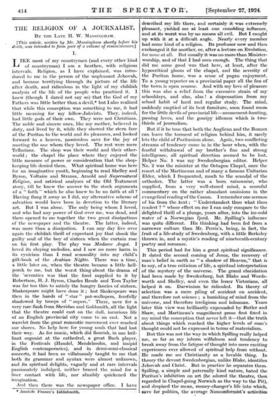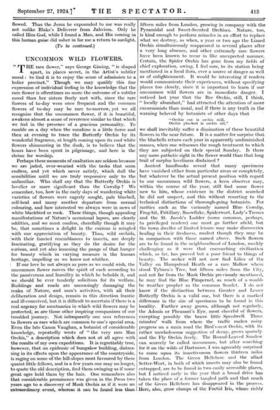THE RELIGION OF A JOURNALIST.
BY THE LATE H. W. MASSINGHAM.
[This article, written by Mr. Massingham shortly before his death, was intended to form part of a volume of reminiscences.]
I.
LIKE most of my countrymen (and every other kind of countryman) I am a heathen, with religious intervals. Religion, as I have explained, was intro- duced to me in the person of the unpleasant Jehovah, and became terrifying through its picture of the life after death, and ridiculous in the light of my childish analysis of the life of the people who practised it. I knew (though I dared not say so) that the God of my Fathers was little better than a devil,* but I also realized that while this conception was something to me, it had little meaning for my fellow-Jahvists. They, indeed, had little gods of their own. They were not Christians. The noble and sincere ones, like my mother, believed in duty, and lived by it, while they showed the stern face of the Puritan to the world and its pleasures, and looked forward to a heaven, passionless save for the joy of meeting the one whom they loved. The rest were mere Tellurians. The shop was their world and their other- world ; the chapel the place where they enjoyed the little measure of power or consideration that the shop- keeping life denied them. What spiritual home was here for an imaginative youth, beginning to read Shelley and Byron, Voltaire and Strauss, Arnold and Supernatural Religion, and satirical analyses of the Old Testament story, till he knew the answer to the stock arguments of a " faith " which he also knew to be no faith at all ? Having flung it away as I did, my alternative scheme of salvation would have been in devotion to the literary art. But I was alone. The only being whom I loved, and who had any power of God over me, was dead, and there opened to me together the two great dissipations of the newspaper and the theatre. The latter, indeed, was more than a dissipation. I can any day live over again the childish thrill of expectant joy that shook the guilty soul of the boy of sixteen when the curtain rose on his first play. The play was Madame Angot. I loved its cloying melodies, and I saw no more harm in its cynicism than I read sensuality into my child's gift-book of the Arabian Nights. There was a time, a little later on, when the theatre became a little hell- porch to me, but the worst thing about the drama of the 'seventies was that the food supplied to it by Robertson, H. J. Byron, Charles Reade and Tom Taylor was far too thin to satisfy the hungry fancies of sixteen. Shakespeare might have done it ; but Shakespeare was then in the hands of ".star " pot-wallopers, fearfully shadowed by troops of " supers." There, save for a very rare flash from Sheridan and Goldsmith, all the light that the theatre could cast on the dull, incurious life of an English provincial city came to an end. Not a wavelet from the great romantic movement ever reached our shores. No help here for young souls that had lost their way. As for music, which did flourish, in one bril- liant organist at the cathedral, a great Bach player, in the Festivals (Handel, Mendelssohn, and insipid English contemporaries), and in demi-semi-classical concerts, it had been so villainously taught to me that both its grammar and syntax were almost unknown, and its spiritual delights, vaguely and at rare intervals passionately indulged, neither braced the mind for a finer contact with life, nor s6nsibly quickened the imagination.
And then there was the newspaper office. I have * Anatole France's ialdabaoth. described my life there, and certainly it was extremely pleasant, yielded me at least one ennobling influence, and at its worst was by no means all evil. But I caught up with it at a difficult, angle. .Nearly every member had some kind of a religion. Its professor now and then exchanged it for another, or, after a lecture on Evolution, for none at all. But usually it was no more than Minister- worship, and of that .I had seen enough. The thing that did me some good was that here, at least, after the hypocritical gloom of the chapel, and the severity of the Puritan home, was a sense of pagan enjoyment. To a young reporter on a proviucial paper all the fun of the town is open sesame. And with my love of pleasure this was also a relief from the excessive strain of my schooldays, and also, alas ! a dispensation from my school habit of hard and regular study. The mind, suddenly emptied of its best furniture, soon found room for the little devils of provincial life—amusement-hunting, passing loves, and the gossipy idleness which is two- thirds of journalism.
But if it be true that both the Anglican and the Roman can leave the torment of religion behind him, it rarely lets the child of Puritanism alone. Again, two conflicting streams of tendency came in in the hour when, with the fearful withdrawal of my brother's fine and strong intelligence, all spiritual direction seemed to be lost, Helper No. 1 was my Swedenborgian editor. Helper No. 2 was the minister at the Octagon Chapel, once the resort of the Martineaus and of many a famous Unitarian Elder, which I frequented, much to the scandal of the orthodox. The latter was a born raisonneur, who supplied, from a very well-stored mind, a scornful commentary on the rather abundant omissions in the evangelical reading of the Canon. I remember one sermon of his from the -text : ". Understandest thou what thou readest ? " whose effect on me I can only compare to the delighted thrill of a plunge, years after, into the ice-cold water of a Norwegian fjord. Mr. Spilling's influence was quite different. His thinking had been fed from a narrower culture than Mr. Perris's, being, in fact, the fruit of a life-study of Swedenborg, with_ a-little Berkeley thrown in, and a mystic's reading of nineteenth-century poetry and romance.
This period had for him a great spiritual significance. It dated the second coming of Jesus, the recovery of man's belief in earth as " a shadow of Heaven," that is to say, of a true criticism of life, a spiritual interpretation of the mystery of the universe. The grand elucidation had been made by Swedenborg, but Blake and Words- worth and Shelley, and even the lesser Victorians, all helped it on. Darwinism he ridiculed. Its theory of selection was a mere piling of accident on accident, and therefore not science ; a banishing of mind from the universe, and therefore irreligious and inhuman. Years later this view was brilliantly-expounded by Butler and Shaw, and Martineau's magnificent -prose first fixed in my mind the conception that never left it—that the truth about things which reached the higher levels of man's thought could not be expressed in terms of materialism.
But this was not the way in which Spilling really helped me, so far as my inborn wilfulness and tendency to break away from the fatigue of thought into mere exciting experiences ever allowed of spiritual help from without. He made me see Christianity as a lovable thing. In theory the devout Swedenborgian, unlike Blake, identifies Jehovah and Christ. But in practice he separates them. Spilling, a simple and paternally kind nature, hated the Puritan's inhibition on art he adored the theatre, then regarded in Chapel-going Norwich as the way to the Pit), and despised the-mean, money-changer's life into which, save for politics, the average Nonconformist's -activities flowed. Thus the Jesus he expounded to me was really not unlike Blake's Deliverer from Jahvism. Only he called Him God; while I found a Man, and His coming in this human guise did usher in for me a return to sunlight.
(To be continued.)







































 Previous page
Previous page